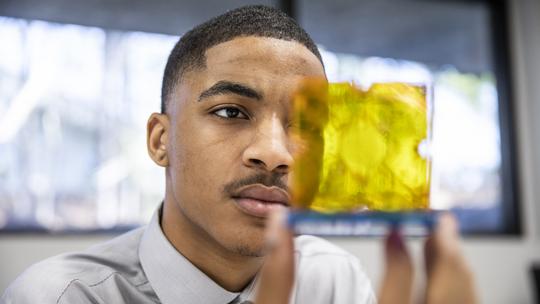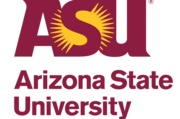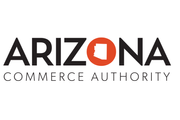
Arizona State University rose three spots to No. 8 for U.S. utility patents issued to universities worldwide in 2021, continuing to help drive American technological evolution and success.
This marks the second year that ASU ranked in the top 10 among universities worldwide and the fourth year that ASU ranked in the top 10 among U.S.-based universities in the annual ranking by the National Academy of Inventors and the Intellectual Property Owners Association.
ASU President Michael Crow said a key to the university’s success goes back to its No. 1 ranking for innovation mixed with transdisciplinary collaboration and partnerships across ASU. He also credits external partners that help expedite discovery and scale solutions to global problems.
“ASU is top 10 in the world for patents, alongside MIT, Stanford and Harvard, because of our rapid, entrepreneurial approach to solving global challenges,” Crow said. “Patents and innovations developed here at ASU are having an impact in the real world, right now.”
ASU secured 153 U.S. patents in 2021, joining other universities in the top 10 including MIT, Stanford University, Purdue University and Harvard University. The 153 patents is an increase from 140 U.S. patents in the prior year.
“This recognition honors the collaboration, dedication and excellence of Arizona State University’s faculty,” said Sally C. Morton, executive vice president of ASU’s Knowledge Enterprise. “Our collective mindset — to inspire and support research that benefits the public — is advancing discovery at an incredible pace. It is our responsibility and obligation to continue to press forward, seeking out and finding solutions that will positively impact our communities and the world in far-reaching ways. Together, we are changing the way the world solves problems.”
Patents for ASU technologies last year included a “fingerprint for things” to improve product authenticity, trust and transparency in supply chains; a self-cleaning coating for solar panels; lab-grown diamonds as semiconductors for electronic components; therapies to prevent neurodegenerative diseases such as Parkinson’s disease; and a vaccine delivery platform to vaccinate chickens.
Skysong Innovations, ASU’s exclusive technology transfer and intellectual property management organization, helps translate research into impact by protecting intellectual property developed in ASU labs and negotiating licensing deals with commercial partners who advance the patented technologies and develop solutions for society.
The organization has secured more than 1,300 U.S. patents cumulatively and closed nearly 1,350 option or license deals with commercial partners during its years of service to ASU. Skysong Innovations has facilitated more than 200 ASU start-ups that have collectively attracted more than $1.2 billion in external funding.*
“Patents often play a key role in protecting a company’s competitive advantage in the market,” said Kyle Siegal, senior vice president and chief patent counsel for Skysong Innovations. “For our commercial partners — new startups and established industry players alike — our patents bolster the confidence they need to invest their own resources in developing ASU innovations into cutting-edge products. Along the way, those partners also generate remarkable economic impact for Arizona and beyond as they create new employment opportunities within our communities.”
To date, ASU-linked startup companies have generated more than $2 billion in economic output within Arizona.*
The report uses data from the U.S. Patent and Trademark Office to find patents that list universities as the first assignee. At a time of intense public discussion of intellectual property protections, the report is intended to showcase the importance of patents in university research and innovation.
“Innovation based on university technology continues to be a key factor in economic development. The expansion of technology and innovation are fundamental to the success of a university,” said Paul R. Sanberg, president of the National Academy of Inventors, in a statement.
Recent patents at ASU are as varied as the teams pursuing them. Below is a closer look at some of the ASU technologies that received patents in 2021.
'Fingerprints for things'
ASU startup DENSEC, through its subsidiary DENSEC ID, develops “fingerprints for things” — secure, item-unique physical identifiers that ensure product authenticity and provide transparency and trust in supply chains.
The “fingerprints” use a continuously branching tree-like form, which gives it a unique and unclonable pattern, to provide a distinctive identity to securely link items in the real world to their associated information in the cloud.
The dendritic identifier technology was invented by Michael Kozicki, co-founder of DENSEC, professor in the School of Electrical, Computer and Energy Engineering and senior global futures scientist at ASU. The patented technology is exclusively licensed to DENSEC by Skysong Innovations.
Self-cleaning coating for solar panels
The flagship product for ASU spinout Swift Coat is a self-cleaning coating for solar panels. When a solar panel gets dirty, it can produce 30% less power than a clean panel.
The coating is composed of nanoparticles that use UV light from the sun to power a chemical reaction that decomposes the dirt that builds up on the panel, keeping it clean and operating at a high efficiency, said Peter Firth, co-founder of Swift Coat.
Zachary Holman, associate professor in the School of Electrical, Computer and Energy Engineering and director of faculty entrepreneurship in the Ira A. Fulton Schools of Engineering, is the co-founder of Swift Coat. He invented an aerosol impact-driven assembly, the manufacturing technology that Swift Coat uses to produce the coating at a commercial scale. The patented technology is exclusively licensed to Swift Coat by Skysong Innovations.
Lab-grown diamonds as semiconductors
Diamond, a material hard enough to cut through almost anything and long regarded as a treasured gemstone, is now being used as a semiconductor for electronic components.
ASU startup Advent Diamond grows phosphorus-doped diamond to produce semiconductor-based electronic components including premium diodes, an X-ray beam monitoring instrument and radiation detectors. Advent Diamond is the first U.S. company to harness a technique that introduces phosphorous impurities while growing the diamond layers.
Therapies to stop neurodegenerative disease
AcureX Therapeutics, a startup company associated with both Stanford University and ASU, is developing therapies to halt neurodegenerative diseases driven by impaired mitophagy, starting with Parkinson’s disease.
Several of the company’s candidate therapies utilize intellectual property developed at ASU.
Vaccines to improve food quality and safety
Roy Curtiss III, former director of the Biodesign Center for Infectious Diseases and Vaccinology, has spent years developing technology for new vaccines to improve food quality and safety, and to prevent serious infections in humans and animals.
He founded ASU spinout Curtiss Healthcare in 2015 and developed a proprietary recombinant attenuated salmonella vaccine delivery platform to vaccinate chickens against necrotic enteritis. The disease is difficult to treat and has a high mortality rate, which can cost the broiler industry billions annually.
Curtiss, Wei Kong, professor in the Biodesign Center for Immunotherapy, Vaccines and Virotherapy, and collaborators were named inventors on an ASU patent exclusively licensed by Skysong Innovations to Curtiss Healthcare for their bacteria-based vaccine delivery method, which was used to bring the AVERT NE vaccine to market.
Arizona State University serves almost 80,000 students across the Phoenix Metropolitan area and is ranked by U.S. News & World Report as the country's most innovative school. Since 2002, the university's mission has been to create a new model for higher education in the United States that meets the challenges of the 21st century.
*According to Arizona State University


